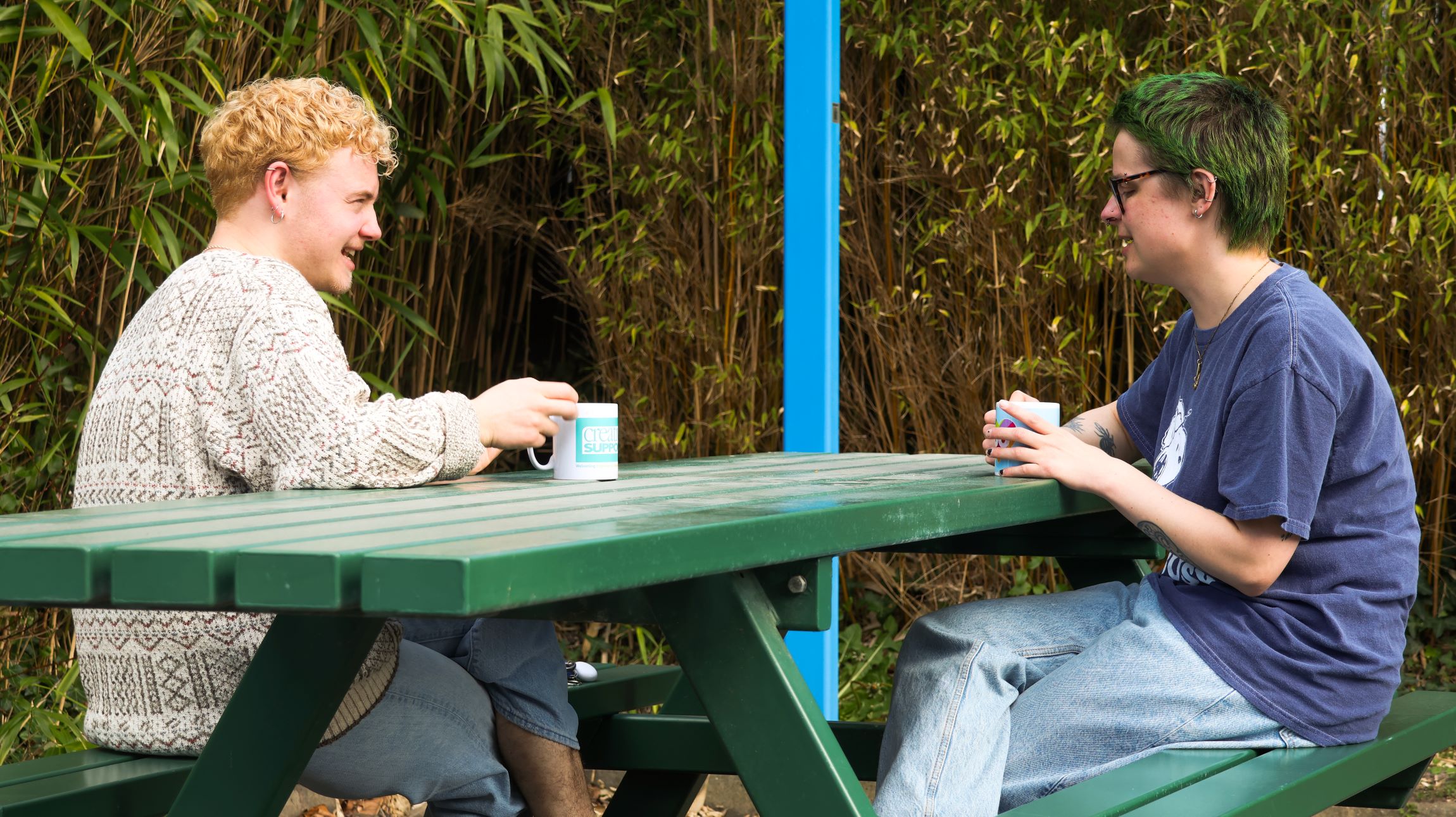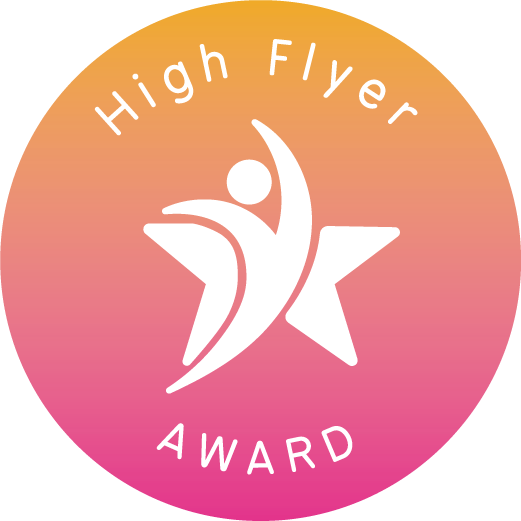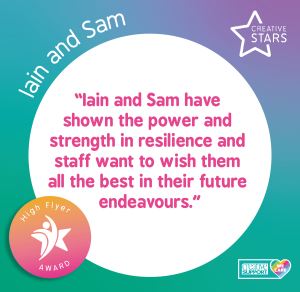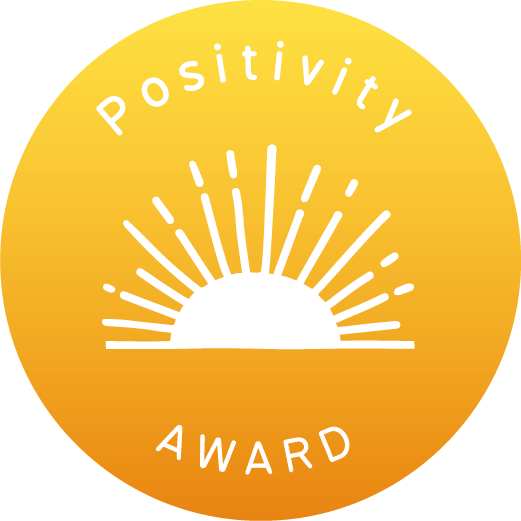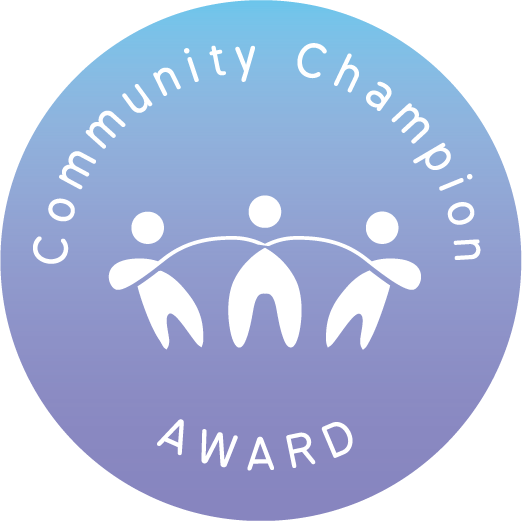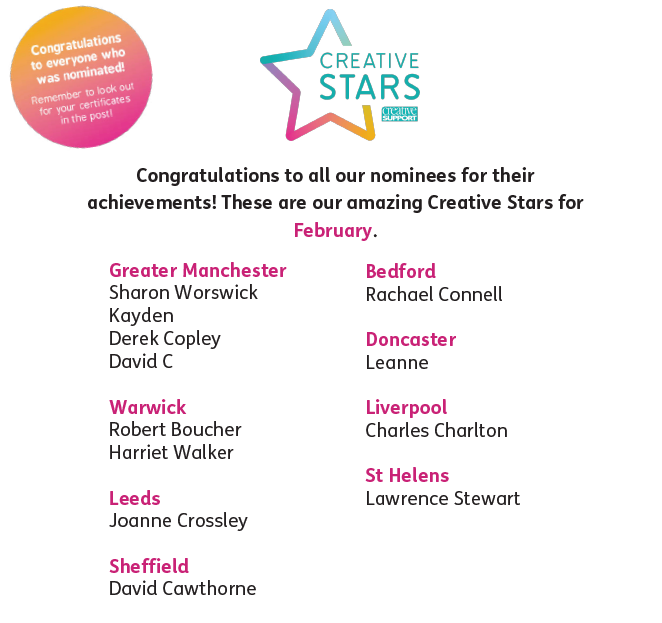Happy Pesach! 7 Apr 11:56 PM (2 days ago)
Esther has worked for Creative Support for over seven years as the PA to the Head of Engagement and Learning, and provides support to our Training Administrators.
As Pesach, also known as Passover, is coming up, she has explained what the Jewish festival celebrates and what a typical day involves.
Pesach (this year running from 12th April – 20th April) is one of the major festivals that Jewish people celebrate throughout the year, and Esther is here to explain why.
What does Pesach celebrate and how long does it last for?
Pesach lasts for eight days and remembers the Jewish exodus during biblical times. During this period, Jewish people were slaves of the Pharaoh and were tasked to build his pyramid. Pesach celebrates the Jewish liberation from slavery and getting out of Egypt and the freedom this gave them – although they spent 40 years wandering in the desert afterwards!
What does a typical day during Pesach include?
Pesach is centred on lots of things that symbolise slavery. During this time we change the foods we eat. If you’re Orthodox then you have two sets of pots and pans. One set is for general food, and the other is only used during Pesach as the foods we eat are restricted.
One thing we can’t eat is unleavened bread, so we eat matzah instead which are like big crackers. This is because when the Jewish people were fleeing from Egypt they didn’t have time to let the yeast rise and had to let it dry in the sun, which created matzah. Because of this we aren’t allowed to eat things such as flour or use any typical bread ingredients. We also have to have ‘Pesach certified’ foods, so we can buy things from Kosher shops that have been specially prepared for Pesach that haven’t been near any bread ingredients just in case of contamination.
Before Passover you would sell your ‘Chametz’ or ‘unleavened’ foods such as bread to non-Jewish people. It’s a symbolic transaction and doesn’t involve the actual sale of the bread, but it means it’s been given away and you’ve cleansed your house. The night before Passover you also do the symbolic search of the house for anything non-Pesach certified. You wouldn’t normally find something because it’s been taken out of the house in preparation for Pesach, so families put little bits of bread around the house and people wander with a candle and a feather and sweep it up to show that your house is clean and you’re ready to bring Pesach in.
The first two days of Passover and the last two are the holy days where we follow Shabbat rules such as no electricity. In the first two evenings you have a Seder service. Lots of people do the service in their own homes.
Growing up we used to regularly have two Seders at our home where we would invite people over for an evening of prayers and food. Part of its purpose is to talk to children about the Passover story and explain it to them. During the evenings we talk about the ten plagues of Egypt when God was trying to intervene to get the Pharaoh to allow the Jewish people to leave. We have a list of them which we go through and customarily dip a finger in wine and spill a drop for each one. The first is blood, which is when the rivers in Egypt turned to blood. Others are mainly environmental, such as the plague of frogs or locusts. The last plague was the death of the firstborn son of every non-Jewish person and was the one that made the Pharaoh change his mind.
Aside from matzah we also eat symbolic food on a Seder plate. Bitter herbs (Maror) is one of the sections and can be represented by lettuce or more commonly with horseradish root which we grate and eat with matzah. The bitter herbs represent the hardships of slavery. We also have an egg in saltwater, the saltwater of which represents tears while the egg represents fertility, growth and new beginnings. We also have a burnt shank bone to represent offerings in the Temple. There is also Charoset which is a sweet paste made from ground walnuts, apples and a drop of wine which represents the mortar used to build the pyramids. You eat these foods at certain points during the evening.
There is also a point during the Seder where you fill a cup of wine to the brim and say a prayer to the angel Elijah who is said to visit everyone’s home on Pesach. There is also a game for the kids or the youngest people at the table. You break a matzah in half and hide one half which the kids have to go and find to win a prize. This is known as the Afikomen.
Over the first two and the last two days of Pesach you would also go to Shul (Synagogue) at certain times like you would on Shabbat. However, at Shul you’re usually given food but during Pesach we can’t as they wouldn’t be able to make the kitchens Pesach certified.
Can you explain the significance of Pesach as a holy day in the Jewish Calendar?
Pesach is one of three major festivals, along with Shavuot (1st June – 3rd June) and Sukkot (6th October – 13th October), and is separate from Yom Kippur and Rosh Hashanah (the Day of Atonement and the New Year respectively). Pesach, Shavuot and Sukkot are known as the Shalosh Regalim or the Three Pilgramage Festivals.
Pesach is the most like Christmas in the non-Jewish calendar. It’s so significant because of the amount of preparation that goes into the festival beforehand, because it commemorates freedom from slavery and encourages loved ones to gather together.
Communications Team Drop In Sessions 7 Apr 1:54 AM (3 days ago)
The Communications Team at Head Office wants to hear your good news stories! We are a team of writers who work on projects such as newsletters, Creative Support’s social media and website, Creative Life and Creative People magazines, award nominations and much more.
The team wants to help your service share your good news stories. Whether your good news story is a brilliant outcome for a person you support, a fantastic fundraising event, or something else entirely, we would love to hear from you.
From Thursday 10th April, the Communications Team
will be hosting Zoom drop-in sessions for anyone to join.
Every Thursday between 9:30-10:30am, you can join the Zoom to discuss:
- What’s going on in your service(s)
- Projects you’d like to be involved in, such as our magazines, podcasts, social media, etc.
- Support we can provide to your events/campaigns/newsletters
- Just to say hello and meet the team!
Please email the Communications Team for the Zoom link.
If you can’t join the Zoom, you can always get in touch with the team via email at communications@creativesupport.co.uk or by calling Head Office via 0161 236 0829
500 Words Competition – Now Open! 6 Apr 11:55 PM (3 days ago)
We are so excited to announce the revival of our of our biggest ever competitions – 500 Words. We want to give staff the opportunity to share their stories and write from the heart.
All you have to do is put pen to paper (or fingers to keys) and share between 300-500 words about your time at Creative Support. Our panel of judges will then select a winner, who will win a whopping £500!
The entries we received in the last round of 500 Words were absolutely incredible, and we loved reading your stories about everything as far ranging as ‘a day in the life’ to a profound memory that has stayed with you throughout your career.
If you need some inspiration, you could think about: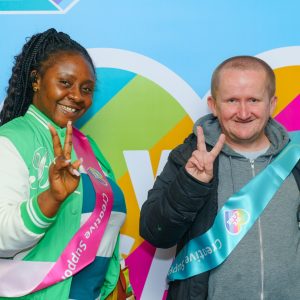
- Something you’ve done that makes you proud
- A memorable moment or two
- Why being part of Creative Support means a lot to you
You can also read our previous winners’ entries by clicking on the link here.
We will also select 10 runners-up who will each win a £20 voucher.
This competition is open to contracted and relief staff along with volunteers.
Download the poster to hang in your service here.
Don’t worry about your spelling or grammar- we’re looking for great stories.
Send your entries to
communications@creativesupport.co.uk
by Friday 2nd May at 5pm.
Keep Learning 31 Mar 11:47 PM (9 days ago)
Our theme for spring is ‘Keep Learning’. Learning new things and developing our skills is really important for our health, wellbeing, and social lives. However, learning doesn’t always mean going back to school or taking exams. There are many different ways—both big and small—to keep learning and growing.
We encourage you to think about what you’d like to learn more about. Perhaps you want to develop a completely new skill, like painting, drawing, dancing, or trying a new sport. Maybe you’re brushing up on a language, revisiting an old hobby, or learning about the wildlife in your area. You might even be perfecting a baking recipe!
There are many reasons why learning is important:
- It keeps our minds active and engaged. When we learn, new connections form in the brain. These connections help improve our memory, mood, and problem-solving skills.
- It opens up social opportunities. Learning a new skill or hobby can introduce us to new people and friendships. For example, playing a new sport allows us to meet teammates, while joining a baking club connects us with fellow bakers who can share tips and tricks on how to bake the perfect fairy cakes!
Our journal, available in all services, includes great ideas to help us keep learning. It offers tips, prompts, and space to record our progress while exploring new interests.
Learning comes in many shapes and forms, and everyone learns at their own pace. That’s why we’d love to hear from you! Tell us about the skills, hobbies, or topics you’re exploring. Email communications@creativesupport.co.uk with your updates, and we’ll share your learning journey on Creative Support’s social media!
A Conversation about Trans Healthcare 31 Mar 1:20 AM (10 days ago)
For International Transgender Day of Visibility, Payroll Administrator, Abs, and Communications Officer, Grae, speak about the healthcare challenges trans-masculine people face in the UK as well as offer their own experience.
We hope through reading this conversation, you learn more about how the healthcare system works for trans people and why being an ally is so important. You can find a glossary of terms that may be new to you at the bottom.
We’re also launching our leaflet, ‘What Does it Mean to be Trans?’ to help staff and people we support navigate coming out as trans. Click here to find out more.
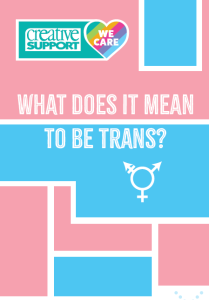
Our leaflet is all about what to do if you’re coming out as trans, and how to support others coming out. It answers some of the most common questions about the trans community including how to use pronouns correctly and how to become a better ally. There is also a list of organisations you can reach out to if you need extra support with healthcare, finding community and other aspects of gender transition.
Read on to hear Grae and Abs in conversation.
Content warning: please note that this article deals with upsetting topics relating to mental health.
Grae: Hey Abs, where shall we start? What do you think about the current state of trans healthcare in the UK?
Abs: Hey Grae, I think the current system is overstretched. Trans people can either get the healthcare they need through the NHS which takes years, or pay an extortionate amount privately. I’ve been in the NHS system since 2021 and only in 2023 was I able to access gender-affirming healthcare. There’s just not the resources for the amount of people that need it.
Grae: There’s also increasing numbers of trans people looking to access healthcare. So, if you’ve been on the waiting list since 2021, is that the waiting list before you’re seen by a gender clinic?
Abs: So, I went to my GP in 2021 who referred me to the gender clinic in Manchester, Indigo, and I was on the waiting list until 2023. I started on testosterone in August 2023, so it’s clear just getting into the system is difficult.
Grae: So the main issue is getting into a gender clinic. Once you’re in there, things move a bit more quickly, but not a lot more.
Abs: For hormones, it does move more quickly once you’re admitted to the clinic, yeah, but I’m also on a waiting list for top surgery two years later and I’ve had to go out of area for it because Manchester stopped taking referrals.
Grae: And how much further have you had to go?
Abs: There aren’t many surgeons in the UK and the only one that was a reasonable distance was in Hull. I’ll be getting top surgery this year.
Grae: Congratulations! But I know the waiting time is extremely painful for many trans people, and that’s when people start to experience really dark thoughts. The statistics are all there. Sometimes you’re able to get bridging hormones. Do you want to talk about what they are?
Abs: I wasn’t actually aware of bridging hormones when I first went to my GP in 2021. No one told me about it. Bridging hormones are a prescription you can get while you wait to be admitted to a gender clinic. They can be life-saving. A lot of trans people will seek out that information via social media or word of mouth, but that wasn’t something I was made aware of by my GP, which is shocking because I know now some GPs will do bridging prescriptions. You have to go to the right GP to do it. It turns out my GP does it, but they didn’t tell me, even when I said I was really struggling.
Grae: I know I’m at the same GP as you, and I only managed to get bridging hormones because I heard from a friend that it was possible at this particular GP practice and I asked for it. The legal requirement is that if a trans person says they are in a very bad place with their mental health or at risk of self-medicating, they can obtain bridging hormones. Most trans people are in a bad place navigating the complicated and biased healthcare system, so it is devastating when a GP doesn’t offer bridging hormones. I had to say, ‘I know you do bridging hormones and I’ve been told that you prescribe that. Will you do that for me if I am severely depressed?’ And they said, ‘Oh okay, we’ll look into it.’ I don’t think most of the GPs were really even aware themselves that it was an option that might save lives, and those who refuse to prescribe are either gatekeeping or worried about losing their jobs amid transphobic headlines and healthcare cultures.
Abs: These barriers are why a lot of trans people end up going through DIY hormone replacement therapy or go private.
Grae: So, who do you think are most excluded from the trans healthcare system?
Abs: People on lower incomes, because they don’t have the option. You see so many people having to do a GoFundMe just to get life-saving healthcare. People with non-supportive families are also particularly excluded as well because if your family isn’t supporting you, and there’s no healthcare professional you can trust, that can feel really lonely.
Grae: Exactly, and trans people of colour and neurodivergent trans people.
Abs: For sure, I’ve heard a lot of healthcare professionals not taking autistic people seriously. I have a friend who is diagnosed ADHD and autistic, and is non binary, and they were really nervous about putting an autism diagnosis on their record, because they were worried that if they eventually went for trans healthcare, they’d not be taken seriously. I was so sad that they felt they had to hide that bit of themselves to access healthcare.
Grae: Yeah, to get a diagnosis of gender dysphoria I worried about disclosing past struggles with mental health. They were asking me whether my mental health issues might have led to me looking for answers such as transness. They even asked me what childhood toys I played with to make sure they were ‘masculine’ enough which is just ridiculous. I think maybe they’re under pressure because what trans people do with their bodies is controversial. There’s a huge lack of trust. It felt as if I was in an interview and trying to prove myself, and at the time I felt so scared and alone and ashamed, especially not having community around me to tell me it was going to be okay.
Abs: I was also really worried about disclosing depression and anxiety to my doctor because I was like, are they just going to put my dysphoria down to my anxiety and my depression? I am pleased to say, they were actually really good and they sort of turned it around like, ‘do you think the dysphoria was contributing to that?’ Talking to my GP wasn’t great, but everyone I’ve met at the gender clinics been really good.
Grae: Sometimes it takes a few brave and empathetic healthcare professionals willing to do the research to make you feel seen. How much do you know about the experience of trans people in healthcare systems in other countries?
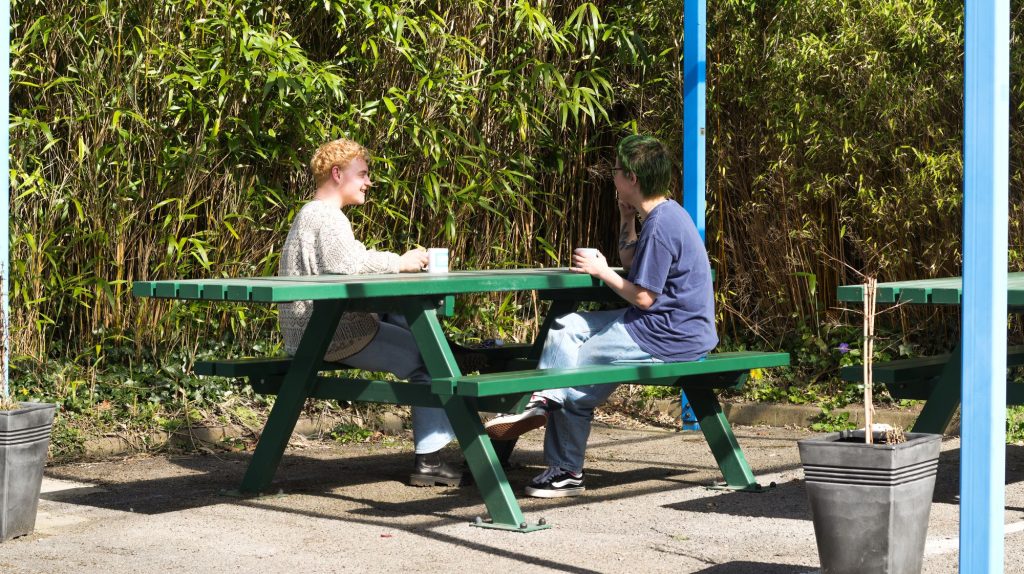
Abs: I think in some European countries, it is better. I know a lot of trans people from the UK go abroad to get surgery because there’s not as much of a barrier and it can be cheaper. For example, Poland and Spain and Turkey, but you shouldn’t have to go abroad to do that.
Grae: Yeah, the thought of going somewhere abroad for top surgery then having to pay for a hotel for two or three weeks while you can’t raise your arms or lift anything sounds really hard. Many employers wouldn’t give sick pay for that, and you need someone else to take all that time off work to look after you as well. What do you think healthcare professionals can do to be better allies?
Abs: I think they just need to be better educated, because I don’t think many GPs have even met many trans people. I had to explain everything to my GP at each stage, how to get hormones and surgery. I think lots of GPs get very nervous about trans stuff and don’t understand it. I think they need better communication too. I’ve had my GP not reminding me I need a blood test, even though it’s in my notes from my gender clinic saying I need them every three months. They had to send me to the walk-in centre on a Saturday at half past eight in the morning to get it done in time for my follow up appointment.
Grae: That’s happened to me so many times! They always forget to remind me, then it delays the whole process and I’m out of hormones for a couple of weeks and that causes terrible mood swings. Sometimes I’ve just had a text basically saying ‘sorry the entire country has run out of testosterone’ and I’ve had to go without for weeks. I feel like any minute the rug can be pulled from under me as a trans person in the UK.
Abs: Yeah we really are managing our care by ourselves. I feel like my doctor just signs off my prescriptions and doesn’t look at anything properly.
Grae: Education and communication are two really good points, and they come down to the government being willing to invest in trans healthcare. Have you heard their stance on puberty blockers for trans kids?
Abs: It’s horrible. I didn’t come out as trans until I was in my 20s, but I know that there are kids who are coming out in their teenage years and not getting the treatment they need because the government have denied hormone blockers to under 18s.
Grae: When that news was announced last year, it was a really awful day. I also didn’t know I was trans until I was in my 20s and in some ways I’m grateful because I didn’t know there was anything I was being denied.
Abs: I can’t imagine coming out as a child and having to navigate a system that seems so hostile towards trans people, especially if you don’t have adults around who can explain it to you and support you. My parents are accepting, but don’t entirely get it and aren’t going to get involved.
Grae: It’s all about trust. I think we can trust young people when they say, ‘I want to make these life changing decisions because I can’t be happy any other way.’ I think many adults think kids are seeing TikToks about being trans, and suddenly deciding to marginalise themselves, but coming out as trans is such a huge process. Kids don’t want to be going to loads of meetings and taking time out of school and bringing potentially unsupportive parents into it. It is not a decision they’re taking lightly. Puberty blockers aren’t even life-changing, they’re reversible.
Abs: People seem to think that kids are just walking into gender clinics and being given hormones like sweets or something and I’m like, that’s not what’s happening, because it’s an excruciating process to go through even as an adult where there are less restrictions.
Grae: On a completely different topic, there are much more clear paths for trans men and trans women since we live in such a binary world, but as a non-binary person, how difficult is the system for you, and what are the specific challenges?
Abs: The gender clinic have been good with giving me choices. I’m on a low dose of testosterone which is what many non-binary people who wish to look more masculine opt for, so I get the changes more slowly. Other non-binary people just want top surgery and not hormones, and can opt for that.
Grae: It’s personal for everyone.
Abs: Yeah there’s not one specific goal, especially with many non-binary people. There’s more nuance.
Grae: Yeah a lot of trans men I know, including myself, are very clear about what kind of changes they want, often the most masculine option. Then there are some trans men who don’t want all changes and obviously an even bigger proportion of non-binary people who don’t want all of the changes. Some trans people want surgeries, some do not. There’s this assumption that trans people immediately want surgeries and hormones, so they can look like a cis person, but that’s not true. I guess that brings me on to talking about how beautiful it is to be trans, because there are just so many different presentations.
Abs: There is no one right way. I got told that constantly during the process by people I met through the gender clinic. I was really nervous, especially because being non binary is not specifically recognised as a legal gender in the UK, so everyone told me this is my path, and I choose what I want. I’m learning to embrace everything I wasn’t sure about, because it feels more like me now.
Grae: Community is so important.
Abs: I learned more about navigating the healthcare system from trans people than I did from the system. I’ve got a friend who’s currently wanting to start the process. They’re like, ‘Abs, tell me everything.’ It’s also important that you don’t have to go through trans healthcare to be trans as well. I think some people, especially non binary people, don’t always get taken seriously because they don’t want hormones or surgery. You can be trans and only change your haircut.
Grae: Yeah, and in this community, there is so much hope and fire in our hearts. It’s amazing how we rally together at an anti-transphobia protest or be everything we ever wanted to be at Trans Pride.
Abs: At Trans Pride, there’s also support with healthcare too which gives me hope. I think the LGBT Foundation who go to Trans Pride help people with deed polls and advice about navigating the system.
Grae: Yeah, there are so many people clearly trying to make a difference. I see on Instagram people doing PhDs on trans health, asking if trans people want to participate in a survey which is just so wonderful. Some of those people will be cis allies as well.
Abs: Yeah, a lot of my cis friends from school are so supportive. They always want to know how I’m doing. One of them came to my first gender clinic appointment with me because I was so nervous. She came and sat with me and took notes. I’m really glad I have allies around me. Even work feels like a safe space to be because people are either allies or queer. The staff LGBTQ+ Network is really good and the changes that we’ve made to the policies are really impactful.
Grae: Yeah we get special leave for appointments now. It’s just invaluable.
Abs: If I need to go to a gender appointment, I don’t have to worry about losing an entire day of pay or annual leave to meet my basic healthcare needs.
Grae: We’re going to be okay. Thanks for talking to me Abs and sharing your story.
Abs: Thank you! And happy Trans Day of Visibility.
Glossary of Terms
Trans-masculine – an umbrella term often shortened to “transmasc” that describes individuals assigned female at birth (AFAB) whose gender identity or expression is masculine. This encompasses trans men, non-binary people, and other identities.
Gender clinic – a healthcare centre also known as a “gender identity clinic” or “gender dysphoria clinic” that offers assessments, psychological support, and medical interventions for trans and non-binary people experiencing gender dysphoria.
Top surgery – a surgical procedure that alters the shape and appearance of the chest to create a more masculine or feminine look for trans and non-binary individuals.
Bridging hormones – a temporary prescription of hormone replacement therapy (HRT) issued by a GP to a patient waiting for specialist treatment at a Gender Identity Clinic (GIC), acting as a harm reduction strategy.
Gatekeeping – refusing to treat trans people or delaying gender-affirming care without a clear health-based reason. It often centres on a perceived need for “mental readiness” or “stability” before medical transition, which can be subjective and discriminatory.
DIY hormone replacement therapy (HRT) – trans and non-binary people obtaining and using hormones for gender affirmation without a prescription or medical supervision.
Gender dysphoria – the severe distress someone feels when their gender identity differs from the sex they were assigned at birth.
Puberty blockers – medications used to delay or stop the physical changes of puberty, primarily in trans and non-binary young people.
Deed poll – a legal document that an individual can use to officially change their name.
What does it mean to be trans? 31 Mar 1:17 AM (10 days ago)
Today is Trans Day of Visibility and we’re so proud share our brand new leaflet titled, ‘What does it mean to be trans?’ produced by our LGBTQ+ Staff Network and the Marketing Team.
The digital leaflet aims to support those who may be questioning their gender identity while answering some of the most common questions. We understand it is not always easy to find information for trans people and hope this leaflet is useful and insightful.
Inside you can find range of important topics informed by trans staff in our community and resources from leading LGBTQ+ organisations:
- Key definitions, such as pronouns, intersectionality, and non-binary identities.
- The steps you can take to become a better ally.
- Practical advice for those who may be questioning their gender identity.
- Online or in-person resources for services and charities.
- Guidance for those who have experienced harmful behaviour.
You can download the leaflet to read on your phone or device. Alternatively, you can print it out to display or share with colleagues and people you support.
Professionally printed versions of this leaflet will soon be available from Head Office. Please email marketing.department@creativesupport.co.uk for these or for guidance on printing your own.
If you have any questions about the leaflet, or wish to become a member of the LGBTQ+ Staff Network, please email lgbtq.network@creativesupport.co.uk.
April Online Activities 28 Mar 6:53 AM (13 days ago)
As part of ‘Doing What Matters to Me’, our year-long celebration of our hobbies, interests, and favourite activities, we’re excited to share our online activities rota for April.
These sessions are open to all abilities whether you’re brand new, revisiting an old hobby, or eager to share your expertise, everyone is welcome!
- Poetry – Working together, we’ll pick themes, language, structure and tone to draft and edit a poem together.
- Where in the World? – Can you guess where you are just by walking around a city, listening to local music and learning about the culture.
- Recipe Swap – Come with your favourite recipes and be ready to learn some new ones!
- Escape Zoom – Work together to solve puzzles and try to escape the Zoom.
- Origami – Join our relaxed introduction to the art of paperfolding – all abilities welcome.
- Improv – Let’s play some improvisational games together and find joy in the spontaneous.
- Tune Traders – Share your favourite songs and discover new ones as we build a playlist together.
- Group Reading – Share a favourite piece of writing or sit back and listen to the host read a short excerpt and engage in the following open discussion.
Download your Online Activities Timetable HERE
Download your Zoom User Guide HERE
Any feedback from these sessions is greatly appreciated, so please let us know what you enjoy and if you have any questions about joining a group or activity, please don’t hesitate to email activities@creativesupport.co.uk
See you online!
You can join all our online groups activities on Zoom via this link:
https://creativesupport-co-uk.zoom.us/j/4312099802?pwd=CrgaL2a4ah96ubSpvdKYhatS0QCcQJ.1
Meeting ID: 431 209 9802
Passcode: X3TjBV
Creative Stars – February Winners! 27 Mar 8:15 AM (14 days ago)
Congratulations to our latest round of Creative Stars winners!
Our service user awards celebrate the people who shine brightly and do wonderful things for each other. We have four exciting category winners, who will receive a badge, £30 Love2Shop voucher and a certificate.
Congratulations to this month’s round of winners:
High Flyer Award
Sam and Iain, Manchester
The powerhouse pair of Sam and Iain have steadfastly been working towards their goals and making the most of every day.
Iain has previously struggled with his health which has affected his daily routine and his love of activities. Not to be deterred, Iain has been “patient, accommodating, and diligent” with his new health routine which has led to tremendous progress in his daily life and wellbeing. Iain is now getting outdoors and enjoying his indoor activities once again, which is amazing to see.
Sam has also been working really hard in achieving her goals towards independence and has been enjoying new activities to boot. She helps with laundry for all residents, keeps her room clean and tidy, bakes delicious treats like cakes and cupcakes for everyone to enjoy, and makes sure she has time for romance by visiting her boyfriend and going on lots of dates with him.
Both Iain and Sam have shown the power and strength in resilience and staff want to wish them all the best in their future endeavours.
Iain and Sam – your hard work to make every day special and meaningful hasn’t gone unnoticed, a huge congratulations.
“Both Iain and Sam have shown the power and strength in resilience.”
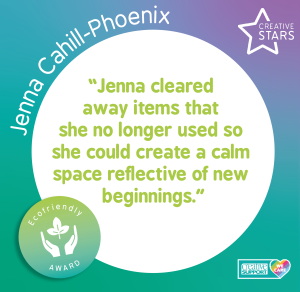 Eco-friendly Award
Eco-friendly Award
Jenna Cahill-Phoenix, Wakefield
New year, new me! Jenna in Wakefield wanted 2025 to be a fresh start, and took it upon herself to do a big clear out of her room. She cleared away items that were no longer used and dropped them off at her local recycling centre and her local charity shop to help create a calm space reflective of new beginnings and help others out at the same time.
Jenna is so happy with her room now she invites all visitors to come in and check it out for the full tour! Staff are so incredibly proud of the hard work Jenna put into her room.
Amazing work Jenna, you should be so proud of yourself!
“We are so incredibly proud of the hard work Jenna put into her room.”
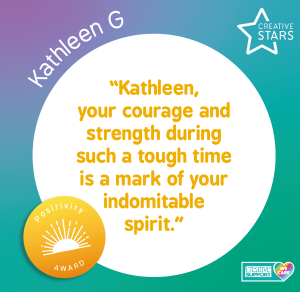 Positivity Award
Positivity Award
Kathleen G, Doncaster
It’s hard staying positive in tough situations, but Kathleen in Doncaster knows it can be worth it in the end. When she received hard news about her health a while ago, she knew the process would be long. Recently, she has undergone successful surgery and recovered like a dream.
Nowadays, you’ll fine Kathleen being a ray of sunshine at her service, doing all the activities she missed like: reading books, colouring in, and getting out and about in the community. Kathleen is so much happier than before and all staff, management, and her family are “extremely excited” for what is to come and the adventures awaiting her.
Kathleen, your courage and strength during such a tough time is remarkable – a huge congratulations on your award.
“Kathleen is a ray of sunshine at her service.”
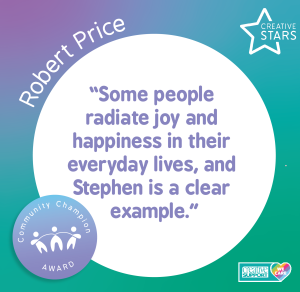
Community Champion Award
Robert Price, Doncaster
Is there anything more fulfilling than achieving your goal and helping others at the same time?
Last year, dedicated Robert in Doncaster set himself a goal of finding a job and worked hard to find the right position. After finding a volunteering role at a local charity shop, he applied and was really happy to be offered the job. He immediately got to work on his training, which he completed in his own time, and then started work with his best foot forward.
After only a few weeks in the role, his employer mentioned that a new paid position could be coming up which Robert is now striving to work towards.
All of the staff at the service, along with Robert’s family and friends, are so proud of him for “stepping out of his comfort zone and achieving this long-standing goal.”
Robert, your dedication and hard work is incredible, keep on keeping on!
“We are so proud of Robert for stepping out of his comfort zone and achieving this long-standing goal.”
Thanks to our Judging Panel
Special thank you to our judging panel in Leeds for deciding this month’s Creative Stars!
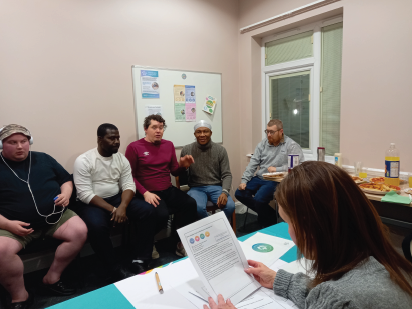
If you’re interested in hosting a judging panel, get in touch by emailing creative.stars@creativesupport.co.uk or by giving us a ring on 0161 236 0829.
Nominate
Nominations can be submitted by staff, volunteers, people we support and family members.
Our next round will close on the 31st March so please submit before this date.
We can’t wait to read your nominations, and we wish everyone the best of luck!
You can find the nomination form on the staff area.
Co-production: Get Involved! 14 Mar 3:32 AM (27 days ago)
Do you want to get involved with Creative Support strategy and share your views on policies?
Get involved with our brand new co-production projects!
Working with staff from Head Office, we’re offering people we support the opportunity to help produce engaging videos about our policies and influence our national strategy.
We currently have three exciting projects on offer:
- Shape Creative Support’s Co-production vision – 27th March at 1pm
- Producing a video with our Multimedia Team to help people understand our Tenant’s Rights policy and feel safe in their home – 7th April at 1pm
- Producing a video with our Multimedia Team to help people understand our Human Rights policy and feel empowered – 17th April at 1pm
You will be given a £20 voucher for contributing your time, and you can either join us in person if you are in the Greater Manchester area or via Zoom.
Each project has ten spaces, but we will be keeping a list of everyone who is interested for any other projects coming up – so don’t worry if you can’t make it this time!
If you’re interested in any of these opportunities, or have any questions about what you will be doing, please get in touch with Abbie Dutton-Guiver at abbie.duttonguiver@creativesupport.co.uk
Creative Mission Competition Winners 10 Mar 5:40 AM (last month)
We received so many brilliant entries for the Creative Mission competition and want to take a moment to thank each and every person who submitted their work.
We asked people to submit their entries inspired by one of the ‘I’ Statements from our new Mission and Purpose Statement:
I live my best life in a place I call home
I feel listened to, respected and valued
I enjoy choices and rights and have control over my life
I am supported to feel safe
I am doing the things that matter to me
I enjoy relationships with others
I am connected to my community
I am supported with my well-being
I feel able to reach my full potential
Thanks to all of you who have shared the competition and got involved.
We received many fantastic entries, from fab artwork to creative writing, and we decided that all initial entries are receiving a £10 voucher.
We have chosen an overall winner for each ‘I’ statement, who will receive £100 in vouchers.
We hope you enjoy the fantastic winning entries below!
Susan C, Birmingham – I live my best life in a place I call home
The place I call home, you could say, is Birmingham. I know that I used to live with my mom and sister, sometimes in Lowestoft or with mum and dad in Bordesley Green, then I moved around a lot.
I had no choices till I was older. I felt I was safe when I met my foster mum and dad. I began running for the Special Olympics and when I was in school, I did a course on human development, childcare and family life, from 1992 to 1994. I passed with merit.
Now, in this life, I’m doing different courses with the staff from the Mental Health Wellbeing Hub. Their names are Ian, Adrian, Shannon, Will, Megan, Emma, and John.
They are helping me a lot to get my goal.
Gift Iyonawan, Wakefield – I feel listened to respected and valued
In the stillness of the morning hours, I enter the atmosphere of the residential home, welcomed by the gentle sound of newspapers shuffling and the familiar aroma of freshly brewed coffee. This space is my refuge, where narratives come alive and bonds grow stronger. As a care support worker, my responsibilities go beyond duties; they involve creating a space where each person is heard, honoured, and cherished.
Today, I saw Mrs. Mary sitting in her spot near the window, with sunlight shining on her hair as she looked through a photo album filled with precious memories that sparkled in her eyes with nostalgia, weight carried by each page turned by her delicate hands. It was clear how much sharing these memories meant to her. “Could you share the story behind this picture?” I gently enquired, while pointing at a faded photograph capturing a woman amidst a garden’s beauty.
Her expression brightened with joy as we engaged in conversation for thirty minutes. I found myself immersed in her stories of love and heartbreak and moments of laughter beneath cherry blossoms in bloom. I responded with nods and smiles, attentively giving her the chance to share openly. In those instances, I was more than a caregiver; I became a confidant, a presence to confide in.
Later in the day, I visited Mr. Ian in his flat. He was sitting quietly on his sofa with a look of concern etched across his face. I walked over with a smile, sensing that something was troubling him. “How are you doing today?” I enquired in a comforting tone. He let out a sigh, then opened up about his family and how he had been feeling isolated and alone. I listened, providing support without passing any judgement. “It’s completely normal to feel like this,” I reassured him. “Your emotions are important.”
When I assisted him in handling his feelings, I noticed the stress melting away from his shoulders. Mr. Ian found comfort in being heard. After I departed from the scene, he expressed gratitude not for my suggestions, but for the opportunity to express himself freely.
In the afternoon gatherings with the residents, we engaged in activities where our conversations played a role in shaping the day for all of us together as a community. It was heart warming to witness how each person’s voice held importance, be it while talking about a book or deliberating on ice cream flavours. Everyone added value to the discussions I led as we explored various topics, ensuring that every resident felt valued and encouraged to participate. These shared moments fostered respect amongst us all, where each individual viewpoint and personal story wove into the fabric that bound our community together.
At the end of the day, as I unwound and looked back on my interactions with others, I realised that my responsibility extended beyond offering assistance; it involved fostering an environment where people felt acknowledged and appreciated. When I stood up for what they required—be it a dish or a beloved pastime—I affirmed their significance in meaningful ways.
As my shift wound down and I looked back at the residents at the Bingo activity, they were exchanging stories in a way that lightened the burden of their concerns for a moment. In their laughter lay my sense of fulfilment. I was aware that my role went beyond caregiving. I had lent an ear to them with respect and appreciation for who they were at their core.
In the fabric of existence, I am thankful to play my part as a connection entwined with the lives of those dear to me. As I venture out into the dusk, I bear in mind the bond that ties our hearts together, each of us acknowledging the value of the other in our path.
Carolyn Mclean, Manchester – I enjoy choice and rights and I have control over my life
Right to be individual
Life’s choices elongate, wrong decisions
Gambling addiction
Supported and connected at Swan Street Manchester Creative Support
Missed opportunities
New horizons, sun bursting through dark clouds
Different techniques for developing creative skills
Negativity
Positivity and perspective on life
New perception for the future
No crossed words
No excuses
Feel free
Control to make life’s choices
As daylight fades
Reflect on life’s situations
Don’t give in, be strong in our individual lives and others
Let’s endeavour to make right choices
Be an individual
Be an optimist
Fatema B, London – I am supported to feel safe
Upon the roof terrace,
The brisk breeze gently blows the sunflower petals.
That boldly stand in their golden yellow shade.
Like a magnet, it attracts.
The parrots that perch above,
Shielded by warmth and love.
Just like sue Starkey, which creates the strongest bonds.
As the days go by, I become more fond.
I ponder the parallels between myself and the birds.
The freedom, safety, and comfort they find
In a secure sunflower bed.
Sue Starkey is my sunflower!
Summer approaches and seasons change.
Yet my passion for supporting people remains.
I hold the people here close to my heart.
To care for, support, and play a big part!
I feel as free as these very birds.
To raise my voice, my worries, my concerns.
Sue Starkey makes me feel most safe.
My second home and my favourite place.
“Once I had my nose pierced and I was very brave, and it did not hurt. I had 4 tattoos, and they only tickled, the staff were amazed.”
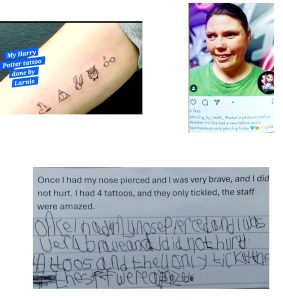
“I have been on the Waltzers with the staff, it was amazing. We go to the mop every year.”

“I have a new job. I clean out the horses, donkeys and sheep houses out. I love my job. I have two guinea pigs called Buzz and Woody.”
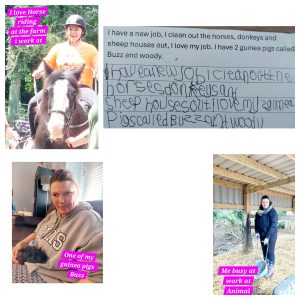
Haroon, North East – I enjoy relationships with others
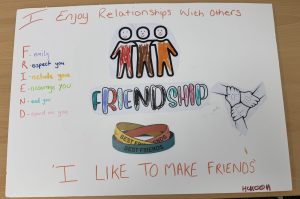
George Allport, Warwickshire – I am connected to my community
“Wendy helps me when I buy cards and gifts and stationery. She is very nice and helpful.”
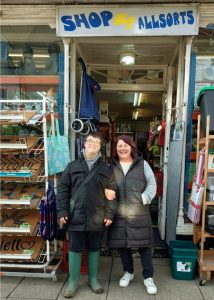
“When I go to the baptism church the service is lovely, they are all very kind and friendly.”
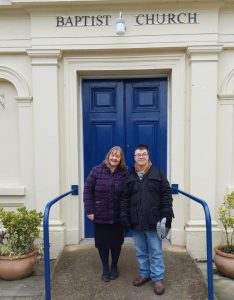
“I wear gym clothes and have a go on the exercise machine, keep fit and very strong and healthy, the staff there are good.”
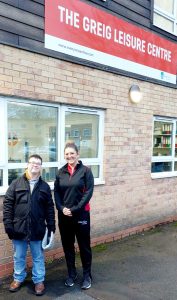
“The bus driver Steve takes me to Stratford and Redditch, Steve is very kind to me and my friends.”
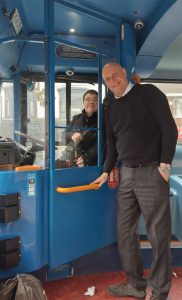
Maria B, London – I am supported with my wellbeing
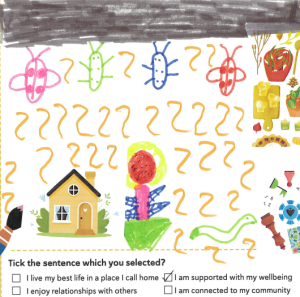
David Johnston, Manchester – I feel able to reach my full potential
My name is David Johnston and I have a physical disability which affects my mobility. I had regular physiotherapy throughout my childhood to help me walk.
After neglecting to do regular exercises, I started having back pain in 2015. After tests, I was diagnosed with borderline osteoporosis. Since then, I try to exercise at least twice a week. I walk, using my wheel chair as an aid, from the tram stop to my house in Altrincham after attending Creative Together and sometimes the Step into the City sessions, which are run by the staff on a Thursday afternoon.
Sometimes I find it too wet, or in the wintertime, too cold to exercise outdoors, so I joined a yoga class at the centre a couple of years ago. Unfortunately, the class didn’t last long as the person leading the session kept cancelling and eventually left.
Creative Together tried to find someone to lead a class but were unsuccessful, and after pestering Zoe and Claire for more movement-based activities, Zoe asked me to run my own exercise class as I was so keen on the idea.
Initially the idea of leading a group was very daunting, so I didn’t mention the idea for a couple of weeks. When it became obvious that nobody from outside the centre was going to run a class. I started to come round to the idea of leading one myself.
So at the start of 2024, I told the staff and the members that I would run an exercise class on a Tuesday afternoon. After extensive research on YouTube I found a video which showed chair exercises. I was unsure whether the class would last any more than a couple of weeks as people would get bored.
Well, I was proved wrong! A regular number of members kept turning up and as the months went on , the attendance was consistent. Eventually, people became fed up of the same video being played. So I stumbled upon a YouTube channel called Improved Health which is run by a woman called Jules. Her chair exercises were more challenging than the other video. It helped the members stay engaged with my class, and I have been getting positive feedback.
In September 2024, I started to keep a weekly log of how many members attended the class and how much money I was making every week. Then, I calculated how much money was made at the end of the month. I did this to ease the workload of the staff and to have more ownership of the class. I was shocked to find out that I have made over £50.00 from September to December 2024.
Running the exercise class has helped me reach my full potential at Creative Together and, at the same time, improve my physical and mental health. I feel more confident in myself, and I am more willing to be more adventurous!
A huge congratulations to all of our amazing winners!
Thanks to all of you who have shared the competition and got involved, we are pleased to announce that we will be holding future rounds throughout the year, so please keep sending entries to communications@creativesupport.co.uk

